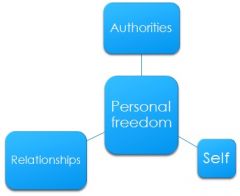![]()
![]()
![]()
Use LEFT and RIGHT arrow keys to navigate between flashcards;
Use UP and DOWN arrow keys to flip the card;
H to show hint;
A reads text to speech;
12 Cards in this Set
- Front
- Back
|
Recap
|
Language = form of social action
examines how people construct their world through accounts and descriptions focuses on => construction => variability => function (action-orientation) examines how function is achieved => rhetorical devices (objectivity, disclaimers, stake management etc.) Critique: => too narrow focus on the immediate interaction linguistic devices => politically limited |
|
|
Discourse Analysis 2 main approaches
|
1. Discursive Psychology (e.g. Potter and Wetherall, 1987)
2. Faucauldian DA (e.g. Parker, 1992) |
|
|
History of FDA Michel Faucault
|

French philosopher, 1926-1984
Focus on power relations and ideology in society Ideology = set of ideas, beliefs, understandings which support the interests of the dominant groups Book – Discipline and punish (1977) maintaining social order through discipline and surveillance not all power is ‘top-down’ ‘disciplinary power’ operates through surveillance and observation Eg Panopticon (Bentham 1785) – The prisoners become their own guards Regulation through self-discipline |
|
|
Subjectivity structures
|
Gender
Age Social relations (sons, daughters, siblings, parents, friends, acquaintances, customers, service providers etc.) Social class Nationality Embodiment (disability, body shape, ethnicity, gender) Institutions (families, school, university, hospitals, church, state) HIERARCHIES (dominant groups) |
|
|
Eg. 1 – Masculinity / Masculinities
|
Dominant (hegemonic) masculinity (Connell, 1995)
=> Identity (“real men”) => Practices (“what real men do”) => Hegemonic discourses support and maintain the interests of the powerful These discourses make the dominant interests appear legitimate So…. being a man = negotiating ‘hegemonic masculinity’ |
|
|
Discourses
|
For Foucault, discourses are practices that systematically shape notions, concepts, characteristics, social phenomena etc.
not just linguistic (may be images, things, buildings, actions etc.). =>FDA – conducted “wherever there is meaning” (Parker, 1999, p. 1) in language: => ways in which a topic is talked about => statements which come together to produce both meanings and consequences in the real world |
|
|
Effects of discourses
|
shape the way in which a topic is understood and represented = different constructions of a topic)
e.g. single motherhood, intelligence, sexuality etc. produce ways of seeing the world and ways of being in the world (Willig, 2001) dominant (hegemonic) discourses: entrenched, taken-for-granted views of the world maintain power relations |
|
|
Discourses
|
“From a Foucauldian point of view, discourses facilitate and limit, enable and constrain what can be said, by whom, where and when” (Willig, 2001, p. 107)
ways of organising, regulating social life are bound up with institutions – (re)produce institutions and institutional practices - e.g.: => Medical discourses => Family discourses => Sexuality => Education => Parenting |
|
|
E.g 2 - Health and medicine discourses
|
Medical discourses:
=> patient = passive recipient of expert care => doctor = expert, active, powerful => patient’s body may be exposed, touched, invaded in processes of treatment Public health discourse: => Public health as means of (self) government |
|
|
Effects of discourse
|
Discourses have real consequences for how men & women experience self in relationships…
=> prescribe behaviours => produce masculinity & femininity as objects … thus they construct subjectivity … and they embody power relations |
|
|
Summary
|
Examines:
the discursive resources available within a culture (e.g. hegemonic discourses, what passes for ‘common sense’) their implications => who benefits => who is disadvantaged subjectivity: => What ways of being (thinking of ourselves, behaving) are open/closed? |
|
|
Comparison between DA and FDA
|

|

